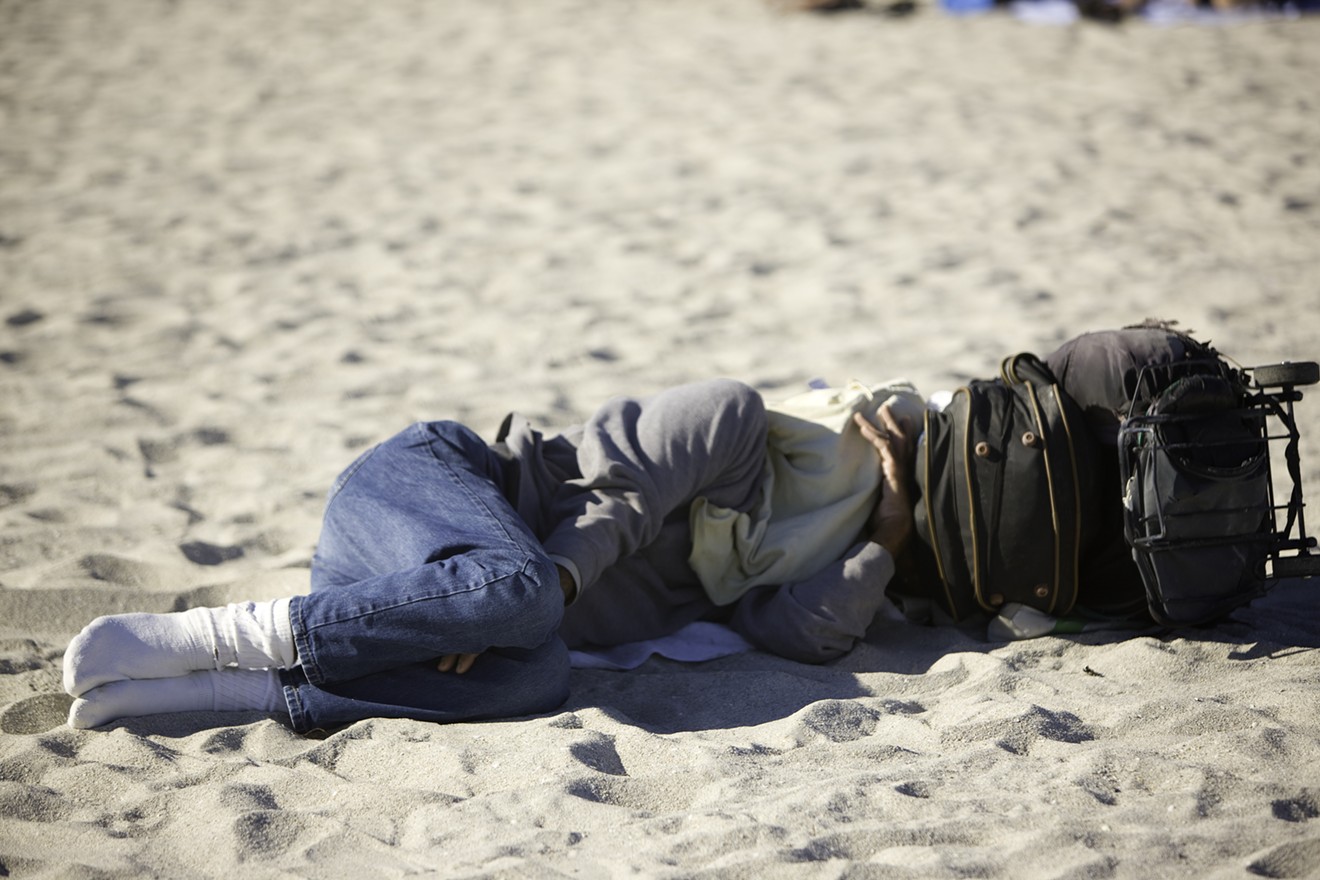Miami's skyrocketing rents and jaw-dropping home prices have many middle-class locals wondering if it's time to pack up and leave. But not everyone has that choice. Some lower-income residents are facing the harsh reality of ending up on the street, leaving Miami's most prominent homelessness assistance organization scrambling to help with limited resources.
"The cost of housing is so high that an alarming number of people are calling our homeless-prevention hotline," Hilda Fernandez, chief executive officer of Camillus House, tells New Times. "We're in one of the most frustrating times."
Camillus House operates a homeless-prevention hotline that qualified Miami-Dade County residents can call to receive emergency housing if they're about to be evicted and fear ending up homeless.
From March 2019 to February 2020, the nonprofit assisted 300 households seeking emergency housing assistance. That number dipped to 117 in 2020 amid Miami-Dade County's eviction moratorium.
But in the past four months alone, 254 families have sought homeless prevention services.
"We are getting a significant amount of requests for assistance from people living a new reality," Fernandez says.
Tenants across the county are experiencing rent hikes as landlords hitch themselves to a real estate bubble that continues to inflate.
In January, tenants at an apartment complex in Hialeah saw their rents shoot up from $1,000 to $1,650 a month almost overnight. In response, Hialeah Mayor Esteban Bovo offered COVID-19-related federal rent assistance for city residents but opposed the idea of rent control.
Tenant groups continue to protest around Miami as South Florida has become the most rent-burdened metropolitan area in the U.S., with the average monthly rent for a one-bedroom apartment exceeding $2,000.
At a summit held this week to address Miami's housing crisis, Miami-Dade County Mayor Daniella Levine Cava announced her goal of adding at least 18,000 units of affordable and workforce housing added to the county's housing pipeline by the end of 2023.
But right now, Miami's supply of affordable housing checks in far below the demand from working-class and lower-income residents.
Fernandez says Camillus House has no available beds at its shelter at 1603 NW Seventh Ave. The building houses 395 beds that are funded through grants, programs, and sponsorships, with an additional 20 beds serving as overflow when needed. All 415 beds are spoken for, and the nonprofit cannot take in anyone else.
"We're beyond capacity right now," Fernandez says. "It's tragic."
Fernandez says Camillus House tries to find housing in the community, but the nonprofit has struggled to find apartments it can afford.
Some sheltered people have Section 8 vouchers through the U.S. Department of Housing and Urban Development (HUD) that allow them to pay a portion of the rent while the government subsidizes the rest. The apartment has to meet certain conditions, however, including being at what the federal government considers "fair market rent" for the size of the apartment.
The problem is, Fernandez says, landlords aren't accepting tenants with vouchers, even with the support of Camillus House, because they can get far more than what the government considers "fair market rent."
"We literally have clients in our emergency housing program sitting on vouchers and looking for apartments to qualify, and they just can't find it," she says. "The fair market rent for a one-bedroom in Miami-Dade County is $1,332. A lot of these landlords won't take $1,332 when they can get much more."
Would-be tenants who are looking for housing after being homeless can face further challenges due to their backgrounds.
"Our clients don't have good credit, they might have some criminal history, and they have long employment gaps. It's a challenge," Fernandez explains.
Federal funding from the pandemic-era CARES Act, which Camillus House used in its homelessness-prevention program to cover rent for at-risk families for a full year, has also dried up. Fernandez says the nonprofit has fully committed all of its CARES Act funding to helping families in need through 2023 and can't accept any more requests for yearlong rent coverage.
Camillus House provides help to sheltered clients to find housing they can afford and employment to make sure they can stay there on their own— but if Miami doesn't work quickly to deal with rent inflation or increase the stock of affordable housing, more residents will be at risk for homelessness.
"The solution has to be a community solution. You can't have a stable community if the workforce can't afford to live there," Fernandez warns.
[
{
"name": "Air - MediumRectangle - Inline Content - Mobile Display Size",
"component": "19274298",
"insertPoint": "2",
"requiredCountToDisplay": "2"
},{
"name": "Editor Picks",
"component": "17482312",
"insertPoint": "4",
"requiredCountToDisplay": "1"
},{
"name": "Inline Links",
"component": "18711090",
"insertPoint": "8th",
"startingPoint": 8,
"requiredCountToDisplay": "7",
"maxInsertions": 25
},{
"name": "Air - MediumRectangle - Combo - Inline Content",
"component": "17482310",
"insertPoint": "8th",
"startingPoint": 8,
"requiredCountToDisplay": "7",
"maxInsertions": 25
},{
"name": "Inline Links",
"component": "18711090",
"insertPoint": "8th",
"startingPoint": 12,
"requiredCountToDisplay": "11",
"maxInsertions": 25
},{
"name": "Air - Leaderboard Tower - Combo - Inline Content",
"component": "17482313",
"insertPoint": "8th",
"startingPoint": 12,
"requiredCountToDisplay": "11",
"maxInsertions": 25
}
]












